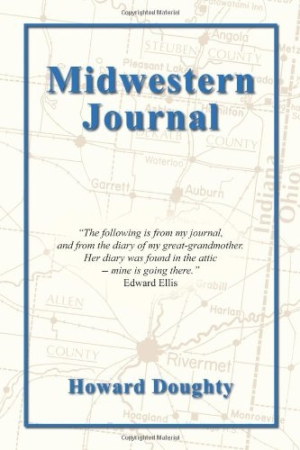Midwestern Journal
Set in the fictional small town of Rivermet, Indiana, Howard Doughty’s entertaining stories tell the tales of Edward Ellis, humble modern citizen, and his great-grandmother, Harriet Hanes, a 1940s farm wife. Edward’s present-day observations, headed by Harriet’s diary entries, paint a fond picture of rural America and its changes over the past century.
The gentle humor in Midwestern Journal instantly brings to mind the quirky citizens of other fictional villages, like Garrison Keillor’s Lake Wobegon, although the citizens of Rivermet are not as painstakingly polite as the folks in Keillor’s home on the edge of the prairie. They are instead unfailingly forthright, but frequently just as funny.
Harriet, in particular, minces no words. “Nice day,” she reports on December 7, 1941, followed by, “War started with Japan.” With an admirable economy of words, Harriet’s journal gives equal attention to the worldwide political scene and the view from her front step.
Doughty contrasts Harriet’s terse voice from the past with the open, friendly demeanor of Edward and his present-day friends. His guileless buddy, Pierson, for one, ponders aloud the oddities of the modern world in his own uninformed, yet insightful, manner. When Edward and Pierson make their way to the Metropolitan Museum of Art, for instance, Pierson can’t quite get behind the notion that an empty frame could be rightly called art. He shares what he feels is the obvious question about the artist—“Was he drunk?”—with an appalled curator who hilariously ends up looking like the uneducated party in the exchange.
Doughty makes fun of pretty much everyone from Rivermet, most of all his narrator. Edward’s adventure stories are perhaps the funniest passages, as he exposes his own foibles in an understated, often deadpan, style. On the hiking trail, for example, when a waterlogged Edward loses his battle with a downed tree, there’s little drama. He simply notes, “I went down to investigate the finer points of mud. Ah, blessed rest.”
Vignettes in the early chapters, featuring Edward alone or with Pierson, are the strongest entries. The short sections could be read in any order, and there are easy laughs in every chapter. Doughty loses the lighthearted atmosphere a bit in the second half of his book, however, when he devotes more than a dozen chapters to Edward’s love life. The trials and tribulations of dating a codependent single mother can go on only so long before readers get as tired of the troubled Teresa as does Edward himself.
At its best, Midwestern Journal captures the rhythms of rural life. Doughty knows these people, and he manages to bathe them in a mildly nostalgic glow while never losing sight of their flawed humanity. It’s the sort of book that, by getting us laughing at others, allows us to laugh at ourselves.
Reviewed by
Sheila M. Trask
Disclosure: This article is not an endorsement, but a review. The publisher of this book provided free copies of the book and paid a small fee to have their book reviewed by a professional reviewer. Foreword Reviews and Clarion Reviews make no guarantee that the publisher will receive a positive review. Foreword Magazine, Inc. is disclosing this in accordance with the Federal Trade Commission’s 16 CFR, Part 255.

